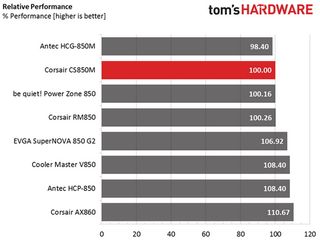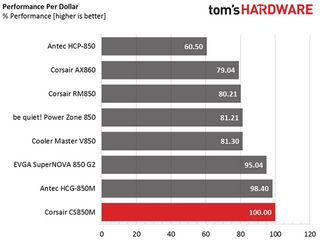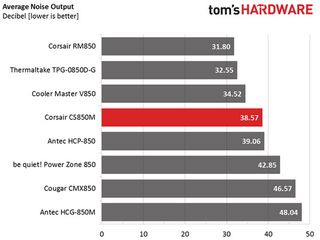Corsair CS850M 850W Power Supply Review
Why you can trust Tom's Hardware
Performance, Performance Per Dollar And Noise Ratings

This graph shows the PSU's total performance rating as it compares to other units we have tested in the past. The tested unit is shown as 100 percent, and every other unit's performance is shown relative to the tested model. Click on the chart to see a more in-depth comparison.
The overall performance of Corsair’s CS850M comes close to the same company's RM850, which costs $20 dollars more. The next comparable 850W PSU is an EVGA offering priced around $35 dollars more. As you can see, though, it achieves a significantly higher performance score.

The chart above may be the most interesting to many readers because it depicts the unit's performance per dollar score. We looked up the current price of each PSU on popular online shopping sites and used those figures and all relative performance numbers to calculate this index. If the specific unit isn't available in the United States, we found it over in Europe, converting the listed price to USD. Note that all the numbers in the following graph are normalized by the rated power of each PSU. You can click on the chart to see more PSUs in the comparison.
Corsair's CS850M improves in the performance per dollar chart, though a price reduction of at least $10 dollars would help it even more.

Finally, this chart illustrates the cooling fan's average noise over the PSU's entire operating range with an ambient temperature between 28 and 30 °C.
The CS850M is definitely not the quietest PSU available. In general, though, it's subtle enough for a majority of power users. If you are extra sensitive to noise, consider spending a bit more on Corsair's RM850 or something comparable.
Current page: Performance, Performance Per Dollar And Noise Ratings
Prev Page Ripple Measurements Next Page Decent Performance; Tough CompetitionStay on the Cutting Edge
Join the experts who read Tom's Hardware for the inside track on enthusiast PC tech news — and have for over 25 years. We'll send breaking news and in-depth reviews of CPUs, GPUs, AI, maker hardware and more straight to your inbox.
Aris Mpitziopoulos is a Contributing Editor at Tom's Hardware US, covering PSUs.
-
Shneiky Another CS PSU with bad caps and short life. And at 120 USD or more than 120 EUR as it appears in my district, this PSU does not stand a chance against the competition. Still a lot of people will buy it just because it has a Corsair name on it. I feel kinda bad that Corsair ruins their legacy of quality with products like CS and VS.Reply -
giantbucket Reply15746324 said:Another CS PSU with bad caps and short life. And at 120 USD or more than 120 EUR as it appears in my district, this PSU does not stand a chance against the competition. Still a lot of people will buy it just because it has a Corsair name on it. I feel kinda bad that Corsair ruins their legacy of quality with products like CS and VS.
and then there are people who are going to hate on it just because it has a Corsair name on it... -
endeavour37a ykki, here is a tier list of PSUs, perhaps this is what your talking about.......Reply
http://www.tomshardware.com/forum/id-1804779/power-supply-unit-tier-list.html -
Shneiky ykki,Reply
I do not hate Corsair products because they are Corsair. I have a Corsair K70 and I love it. What I hate is cheaply made equipment that wants a price premium because it is X brand.
-
Aris_Mp @ykki The relative performance graph can play this role and with much more accuracy. However it measures pure performance and doesn't take into account other factors as output noise, warranty period etc. For these factors a final rating is needed, indeed.Reply -
damric Good review, Aris.Reply
I see no reason to buy this PSU when there are other good units with lower price built with better components. Example: Many XFX (Seasonic) and Golden Green (Capstone/B2) cost less but are more reliable with all good caps. Unfortunately, most consumers will be suckered in by the Corsair sticker.
On the bright side, these Great Wall units have far less problems than the CX series. Probably even more reliable than the RM.
